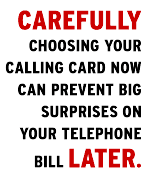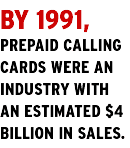| |||||||||

Hang up on prepaid calling card scams
 Long-distance rates as low as 3 cents per minute are advertised for prepaid calling cards sold at convenience stores and on the Internet. But many of these offers are so bogus that the cards might actually be considered a form of gambling. Long-distance rates as low as 3 cents per minute are advertised for prepaid calling cards sold at convenience stores and on the Internet. But many of these offers are so bogus that the cards might actually be considered a form of gambling.
The problem has become so bad that ABellTolls.com, a Web site that rates telephone pricing offers, refuses to list any prepaid calling cards at all. "There is really a big difference between the prepaid and billable calling card industry," Marc-David Seidel, co-founder of A Bell Tolls, said in an interview. "Those prepaid cards can be a really risky path." Billable calling cards don't charge customers for long-distance calls until after those calls are actually made. Prepaid calling cards, by contrast, require payment in advance for blocks of time. Buyers often don't learn until too late that prepaid cards add a "connection charge." This charge may be as high as several dollars for each call. In one of the first crackdowns on prepaid calling card scams, New York Attorney General Eliot Spitzer announced on July 26 a legal settlement with Televend, a Whitesboro, N.Y., company. According to Spitzer, Televend sold prepaid calling cards from vending machines with large signs that advertised rates as low as 3.9 cents per minute.
"It was not disclosed, or it was disclosed in extremely fine print or on hard-to-read signs, that there were other fees and connection charges that greatly increased the price of a call," Spitzer said in a statement. In the settlement, Televend agreed to pay $4,000 for public-service advertisements warning consumers about prepaid calling cards. Even worse than cards with high fees, however, are companies that repeatedly shut down and open under new names after selling blocks of time to numerous customers. "Many fly-by-night operations open up with flimsy financing, sell a bunch of their cards, and then stop paying the underlying (telephone) carrier," Seidel said. "The underlying carrier, which frequently is a large, well-known company, then cuts off the fly-by-night operation, thus stranding all of the consumers that had purchased the cards." Prepaid calling cards' popularity has grown enormously since the United States deregulated the long-distance industry. In 1995, sales of prepaid cards totaled $750 million, according to Consumer Action, a public-interest group in San Francisco. By 1999, prepaid calling cards were an industry with an estimated $4 billion in sales. Only 10 U.S. states have adopted or are considering disclosure requirements, Consumer Action says. "Fees and monthly charges show up only in very fine print, or not at all if there is no state disclosure requirement," the group said in a statement. It's often necessary to make long-distance calls from a phone away from your home or office. So how do you protect yourself against prepaid calling card scams? A Bell Tolls recommends that you consider using a billable card that you don't have to prepay. The site's rankings show many legitimate calling card offers with interstate rates as low as 5.1 cents per minute. Seidel says the ratings are objective, although A Bell Tolls does receive a fee from some companies for referrals from its Web site. At the top of the ratings is the AccuLinq card from Cognigen Networks. Interstate calls are 5.1 cents per minute from major cities in Texas and Colorado, and 9.2 cents elsewhere, including taxes. The cost is 30 cents extra for each call made from a pay phone--a surcharge required by the U.S. Federal Communications Commission. The company charges no connection fee per call, but requires a minimum payment of $1 per month. Another company, Univance, serves customers in most of the United States for 6.35 cents per minute. In addition to the standard pay-phone surcharge, Univance has a connection fee of 25 cents per call and a minimum payment of $1.06 per month. Carefully choosing your calling card now can prevent big surprises on your telephone bill later. Consumer advocate Brian Livingston appears at CNET News.com every Friday. Do you know of a problem affecting consumers? Send info to tips@BrianLivingston.com. He'll send you a book of high-tech secrets free if you're the first to submit a tip he prints.
who's speaking? |
|
|||||||||||||||||||||||
|
Send us news tips | Contact Us | Corrections | Privacy Policy |
|

